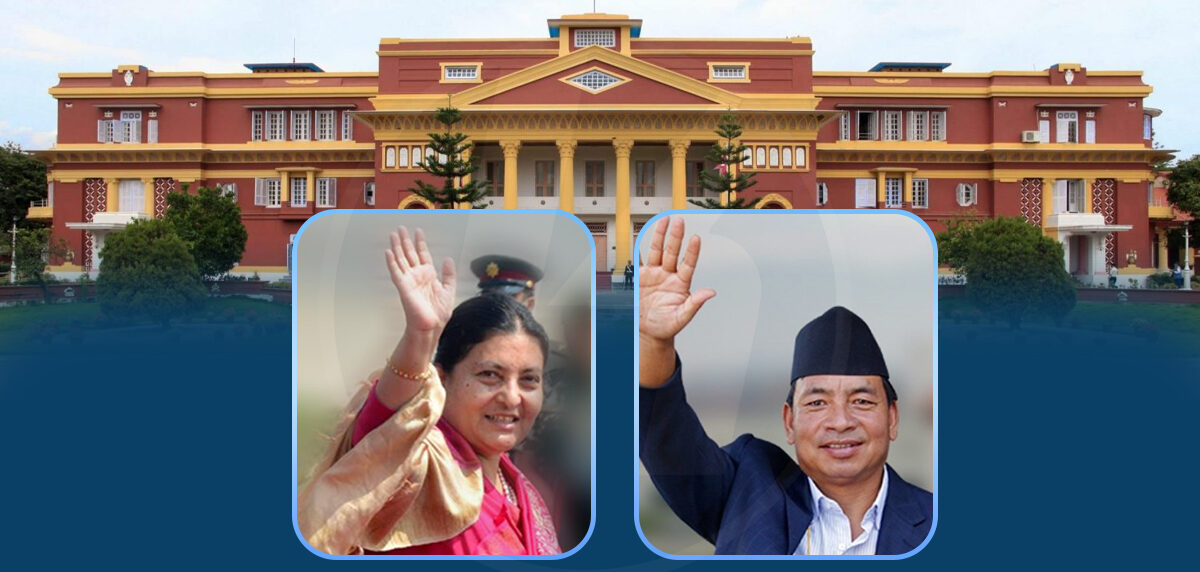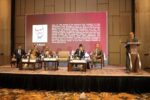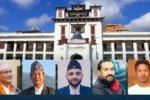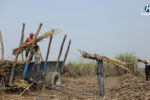KATHMANDU: Since the establishment of the federal democratic republic in Nepal, Bidya Devi Bhandari and Nanda Bahadur Pun ‘Pasang’ have been fortunate to serve as President and Vice President, each for two terms.
Bhandari, from the ruling CPN-UML, and Pun, from the Maoist Center, hold these prestigious positions in the country’s political history.
Bhandari served two terms as both President and Vice President, with her tenure as President spanning from 2072 Kartik 12 to 2079 Falgun 29.
Pun, who served as Vice President from 2072 Kartik 15 to 2079 Chaitra 5, was also a prominent figure during this period.
Following the end of the monarchy, Dr. Ram Baran Yadav of the Nepali Congress became Nepal’s first President, while Paramananda Jha, representing the then Madhesi People’s Rights Forum, became the country’s first Vice President.
Dr. Yadav’s term ran from 2065 Shrawan 8 to 2072 Kartik 11, and Jha served from 2065 Shrawan 8 to 2072 Kartik 14.
Bhandari’s achievement of becoming Nepal’s first female President is notable, marking a significant milestone in the country’s political landscape.
Constitutional scholars, however, argue that while the constitution does not explicitly ban former presidents and vice presidents from returning to active politics, it is generally considered inappropriate due to the dignity associated with their positions.
However, her participation in the public and political sphere since stepping down has sparked speculation regarding her potential return to active politics.
In Nepal’s democratic system, the highest-ranking officials are the President and Vice President.
While the Prime Minister holds executive power and the federal parliament wields substantial influence, the President and Vice President are positioned as the first and second highest authorities in the country.
Given their ceremonial roles, former Presidents and Vice Presidents typically retire from active politics.
This was true for Dr. Yadav and Jha, both of whom refrained from engaging in active political roles after their terms ended.
Although they occasionally participated in social events, they did not return to the political stage.
However, recent developments suggest that Bhandari and Pun, having completed their second and third consecutive terms, may be preparing to re-enter party politics.
Pun was seen at the central office of the Maoist Center in Parisdanda on a Thursday afternoon, while Bhandari met with UML Chairman and Prime Minister KP Sharma Oli later that evening, fueling speculations among political observers.
Bhandari’s involvement in political events goes back to last Ashad, when she attended a program organized by the Madan Bhandari Foundation to mark the 72nd birthday of Madan Bhandari, a prominent leader of the UML.
Since then, she has engaged with various UML leaders, including Yogesh Bhattarai, a member of the House of Representatives.
Bhattarai, who met Bhandari twice, publicly acknowledged their discussions but clarified that it was too soon to talk about her return to active politics.
He remarked in a television interview, “It is too early to discuss the issue of the former President returning to active politics. It is not certain who will lead our party in the future. Why create unnecessary tension within the party?”
Despite growing speculation about Bhandari’s return, Bhattarai emphasized that nothing definitive was stated during his meetings with her.
He added, “The former President has been involved in social and political activities, which has led to speculation that she might re-enter party politics. However, she never mentioned this directly. I do not know what discussions she had with Chairman Oli.”
Bhattarai did suggest that Bhandari could return to politics in cooperation with Oli if the party faces challenges in the future.
He asserted that Bhandari would not challenge existing party leaders for the position of UML chairperson.
“I do not believe former President Bhandari will compete for the position of UML chairperson. If she returns to lead the party, it will likely be through an agreement with Chairman Oli,” Bhattarai concluded.
UML Secretary Bhattarai stated that if former President Bhandari were to return to the party, it would require discussions and consideration of international practices.
“But I do not believe this is the right solution. It could negatively affect the performance of future presidents or vice presidents, as their actions may be driven more by party interests and personal ambitions rather than the broader national interest.”
However, Bhattarai emphasized that the constitution does not explicitly prohibit former presidents and vice presidents from re-entering active politics.
Constitutional scholars, however, argue that while the constitution does not explicitly ban former presidents and vice presidents from returning to active politics, it is generally considered inappropriate due to the dignity associated with their positions.
Constitutional scholar Bipin Adhikari explains that the president and vice president hold the highest-ranking offices in the country, and it is not customary for individuals who have occupied these roles to re-engage in ordinary political activities.
“If it were explicitly stated in the constitution that former presidents should not return to active politics, that would be clear,” Adhikari states.
“However, according to both international practice and our own traditions, there is no precedent for returning to active politics.”
Adhikari also pointed to former King Gyanendra Shah, noting that he refrained from active politics because of the high dignity associated with his position.
“That is why former King Gyanendra has remained silent,” he told Khabarhub.
“If he had wished to engage in politics, he certainly had the political foundation to do so!”
Adhikari argues that former presidents and vice presidents who receive state services should not engage in partisan politics.
“There is a belief that those who have received the protocol, state services, and protection afforded by the government of Nepal should not partake in win-lose politics,” Adhikari said.
“If winning and losing do not define a person’s role as part of the nation, then how can they be the president or vice president?”
Political analyst Geja Sharma Wagle went further, arguing that the constitution should be amended to prevent former presidents and vice presidents from returning to active politics.
Political analyst Shankar Tiwari raised concerns about the potential negative consequences of Bhandari and Pun returning to active politics, suggesting it could harm the effectiveness of future presidents and vice presidents.
“It seems that both former president and former vice president are trying to become active in the activities of their previous parties. One reason for this is the leadership crisis in those parties,” Tiwari told Khabarhub.
“But I do not believe this is the right solution. It could negatively affect the performance of future presidents or vice presidents, as their actions may be driven more by party interests and personal ambitions rather than the broader national interest.”
Tiwari also noted the difference between democratic countries and dictatorial regimes.
“In dictatorial Russia, Vladimir Putin has held multiple terms as president and prime minister over the course of 25 years. But this is not possible in Nepal,” he explained.
“In democratic countries, it is not typical for a former president to return to active politics. Even in neighboring India, respected figures who have retired generally do not re-enter the political stage.”
Political analyst Geja Sharma Wagle went further, arguing that the constitution should be amended to prevent former presidents and vice presidents from returning to active politics.
He believes that such a move would not only be controversial but would also contradict the principles, values, and practices enshrined in the Constitution and the democratic republic.
“Former President Bidya Bhandari and former Vice President Nanda Kishore seem to want to return to active party politics,” Wagle wrote on the social media platform X (Twitter).
“This is not only wrong and controversial but also against the principles, values, practices, and precedents of the Constitution and the democratic republic. It is necessary to amend the Constitution and introduce restrictive provisions.”









Comment